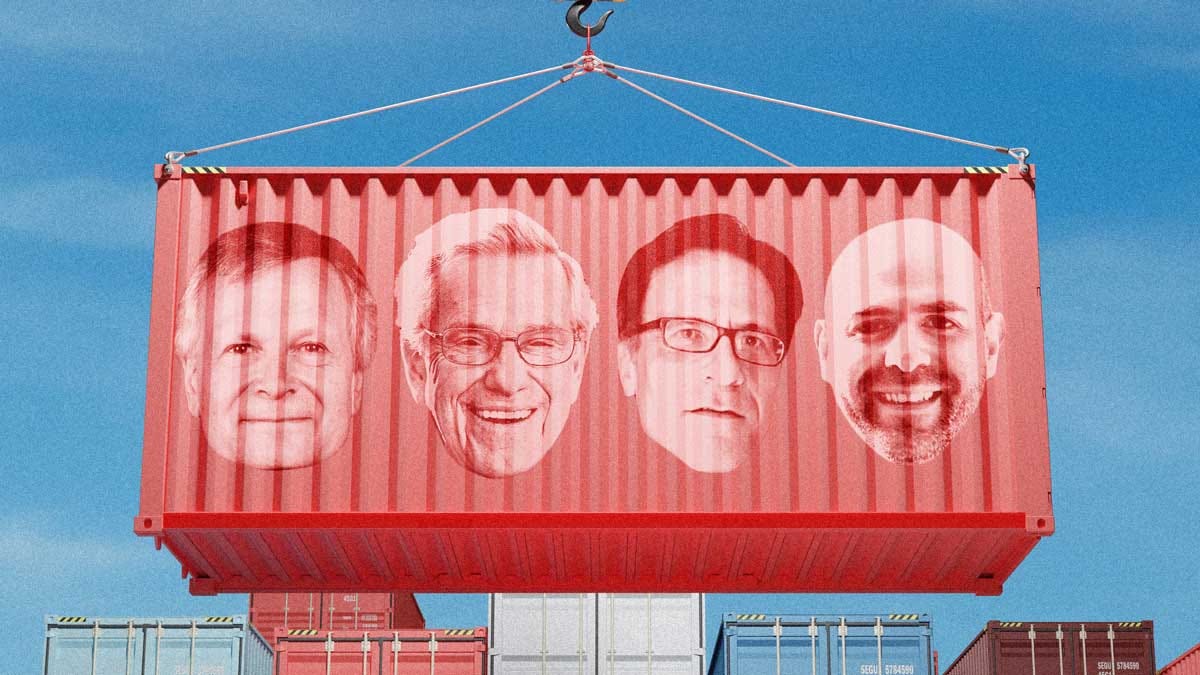The Intellectual Godfathers of Protectionism Once shunned, globalization’s doubters turned out to be right about its destructive economic and social consequences. What do they think of what Trump is doing?
From heretics to prophets: Author Joe Nocera explains how economists Dani Rodrik (from left), Clyde Prestowitz, Michael Pettis, and Steve Miran have been vindicated. (Illustration by The Free Press)
When a 40-year-old economics professor at Harvard University named Dani Rodrik was preparing to publish his first book in 1997, he sent the manuscript to a fellow economist to ask for an endorsement. The title of Rodrik’s book was Has Globalization Gone Too Far?, and it argued that without government policies to mitigate the downside of free trade, the result would be deep and corrosive social divisions. The economist he approached—Rodrik won’t name him except to say he is “well-known”—declined. Why? Not because he necessarily disagreed with the analysis, Rodrik told me, but because “he said I was giving ammunition to the barbarians.” The “barbarians” were men like Pat Buchanan on the right and Richard Gephardt, the Missouri congressman, on the left, both of whom railed about how free trade cost American jobs during their losing presidential races. The North American Free Trade Agreement was 3 years old when Rodrik published his book, and the elites in Washington and Wall Street viewed it as a triumph of globalization; it would create jobs in Mexico, where labor costs were low, give the U.S. the glorious gift of lower prices, and bind the three countries together via trade. The barbarians, meanwhile, wanted to replace the free-trade principles that were guiding U.S. trade policy with rank protectionism. Though most economists were at least dimly aware that globalization was causing factories to close and workers to lose their jobs, that was not something they were willing to study or even talk about. Because that theory—”comparative advantage,” it was called—was one of the cornerstones of economics, Rodrik said, economists didn’t want to “undermine it by acknowledging some of the problems.” As David Rothkopf, a political scientist who worked in Bill Clinton’s Commerce Department told me, the speeches administration officials—all devout globalists—would make back then were “quasi-theological.” “We’d say, `We’re not losing jobs to emerging countries; we’re losing them to progress.’ ” When NAFTA came into effect, I was just starting a job at Time Inc.’s business publication, Fortune, and like every business journalist I knew, I was all-in. We started to use the term “neoliberalism;” its personification was Clinton’s treasury secretary, Robert Rubin, who had been the co-chairman of Goldman Sachs before joining the Clinton administration. Journalists like me covered free trade—including the rise of China’s export economy, and the establishment of auto parts factories along the Mexican border—as if we had been handed Holy Scripture. Without a scintilla of doubt, we believed that globalization created so much prosperity around the world that the loss of jobs in places like Flint, Michigan, and High Point, North Carolina, was a small price to pay. And yet here we are, a quarter century later, with the elites having lost much of their authority and neoliberalism no longer the ruling dogma. It is people like Rodrik who have won the argument, at least for the time being. Today, with President Donald Trump imposing huge tariffs on China and on-again-off-again tariffs on the rest of the world—including, just this week, foreign movies of all things—the case against neoliberalism isn’t a fringe opinion. It’s the logic of White House policy. And despite the uncertainty of the stock market, and the terrified reaction of U.S. businesses, 77 million people voted for the man who has said that “tariff is the most beautiful word in the dictionary.” Which leads to the obvious question: What did those of us who believed in neoliberalism and globalization miss? To put it another way, what did the handful of skeptics like Rodrik see that the rest of us didn’t?...
Become a paid subscriber Get access to our comments section, special columns like TGIF and Things Worth Remembering, tickets in advance to our live events, and more. UPGRADE TODAY |

